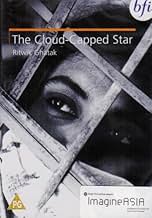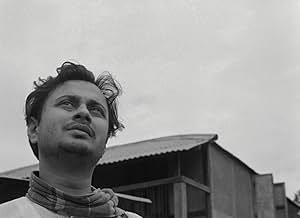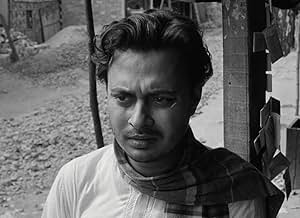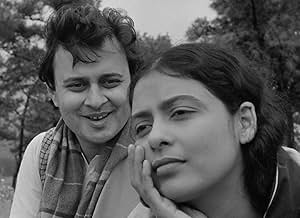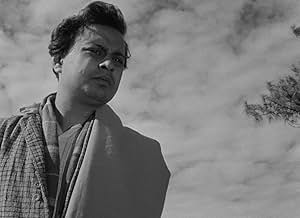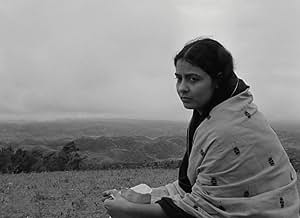ÉVALUATION IMDb
7,8/10
3,5 k
MA NOTE
Ajouter une intrigue dans votre langueA selfless young woman (Supriya Choudhury) sacrifices her own happiness for her unappreciative family.A selfless young woman (Supriya Choudhury) sacrifices her own happiness for her unappreciative family.A selfless young woman (Supriya Choudhury) sacrifices her own happiness for her unappreciative family.
- Prix
- 1 nomination au total
Ranen Ray Choudhury
- Baul singer
- (as Ranen Chowdhury)
Avis en vedette
'Meghe dhaka tara' or the 'Cloud-clapped Star' is definitely one of the best films ever directed in Bengali,and it vividly portrays the directing skills of Ritwik Ghatak. The story revolves around a lower-middle class Bengali family, who lived in the refugee colonies situated in the outskirts of Kolkata. The father of the family was a English teacher and his eldest son 'Shankar'(Anil Chatterjee) was a promising young classical singer while the youngest son 'Montu' played football. Nita and Gita were two sisters, the former being somewhat responsible, caring, loving while the latter was simply a beauty conscious,lazy, insincere flirt. Owing to circumstances, Nita had to work as a private-tutor in order to feed her family as no one else had any urge, capacity or rather consciousness about their poverty. Another important character of the movie was Sanat, a talented Physics research fellow whom Nita sponsored for she had affections on him. According to the story Nita a working woman, couldn't spare time on him and Gita, her sister began having relations with him and eventually they married. Nita was heartbroken and neither Sankar nor their father supported their marriage. Sanat after his marriage didn't continue his research and found himself a job of high salary. Eventually Sankar established himself as a singer, Montu found a job in a factory, while Nita's health began deteriorating. It was found she was suffering from TB. She was sent to a sanatorium upon the mountains to recover and the film ends with Nita's death. One the last scenes perhaps the best of the film wonderfully shows Nita's love for life, her urge for struggle and her positive thinking. The film's one of the most impressing assets is the song, 'Je raate mor duar Guli' song beautifully by Debabrata Biswas. It was really suitable with the sad situation after Gita's marriage. The film over all portrays the life-struggle of a promising family with contemporary middle class livelihood. Actings of Anil Chatterjee and Supriya Devi is of high quality and the over all direction, screen-play, music equally good. The 'Lost Love' by William Wordsworth finds a perfect match in the movie.
This movie by Ritwik Ghatak is on the list of most of the Indian big times directors as one of the best movies of Indian cinema. The name of the movie means Cloud Capped Star what a lovely name.
The story is about a girl Nita (Supriya Choudhury) in a family who have migrated to India from Bangladesh, after the partition and staying in a small West Bengal town in poverty. Nita is the second child in the family of two boys, two girls and parents. After her father's (Bijon Bhattacharya) health detoriates she has to take the responsibility of being the bread winner because she is educated. Her beloved elder brother Shankar (Anil Chatterjee) is an aspirational singer and does not want to work. Her younger brother Mantu (Dwiju Bhawal) leaves his studies and becomes a daily laborer. Nita's boy friend Sanat (Niranjan Roy) gets attracted to her sister Gita (Gita Ghatak) and marries her. Nita carrier the burden of all these silently, but it takes toll on her health and mind who is finally sent to treatment in a remote hospital where Shankar goes to meet her in the end of the movie.
The movie though latent in high emotions is a superb story unfolding, with so much humanness that it touches your heart even today through it (sometimes) melodramatic 1960 style.
This was the first movie of Ritwik Ghatak that I have seen till date, and I consider myself fortunate, because Ritwik was called by the Life Time Oscar winner Satyajit Ray as his inspiration and Satyajit Ray always considered Ritwik the best in India.
Ritwik presents the drama with such finness of light and darkness, using great visuals, sound and symbols to present a tender emotion. The foliage, the train, the mountains, the soul rendering vocals remain with you for long after the movie.
A must see for all the students of good cinema. A master piece indeed! (Stars 7.75 out of 10)
The story is about a girl Nita (Supriya Choudhury) in a family who have migrated to India from Bangladesh, after the partition and staying in a small West Bengal town in poverty. Nita is the second child in the family of two boys, two girls and parents. After her father's (Bijon Bhattacharya) health detoriates she has to take the responsibility of being the bread winner because she is educated. Her beloved elder brother Shankar (Anil Chatterjee) is an aspirational singer and does not want to work. Her younger brother Mantu (Dwiju Bhawal) leaves his studies and becomes a daily laborer. Nita's boy friend Sanat (Niranjan Roy) gets attracted to her sister Gita (Gita Ghatak) and marries her. Nita carrier the burden of all these silently, but it takes toll on her health and mind who is finally sent to treatment in a remote hospital where Shankar goes to meet her in the end of the movie.
The movie though latent in high emotions is a superb story unfolding, with so much humanness that it touches your heart even today through it (sometimes) melodramatic 1960 style.
This was the first movie of Ritwik Ghatak that I have seen till date, and I consider myself fortunate, because Ritwik was called by the Life Time Oscar winner Satyajit Ray as his inspiration and Satyajit Ray always considered Ritwik the best in India.
Ritwik presents the drama with such finness of light and darkness, using great visuals, sound and symbols to present a tender emotion. The foliage, the train, the mountains, the soul rendering vocals remain with you for long after the movie.
A must see for all the students of good cinema. A master piece indeed! (Stars 7.75 out of 10)
If I have to chose one movie in my life then it would be this. Ultimate cinematic experience would be an under statement as it is more than that. I can think of Ritwik as the Indian answer to Stanley Kubrick. Meghey Dhaka Tara is like Clockwork Orange made by an equally eccentric and obscure genius, whose impact is appreciated much after his death. The contrast is, unlike Kubrick, very few people know about him as the rating shows here where as, it should have been in the cannon of every cinephile around the world. It is the responsibility of those few of us who have watched it, to spread it. I would like to spend some time here discussing what is so special about the movie.
First of all it is a movie that celebrates beauty. The beauty of nature as captured by some of the breath taking shots of trees that I have ever seen in a movie, the beauty in the affection between the brother and sister eating together side by side, or the face of Neeta gleaming under the sun when Sanat arrives or the beauty captured in Neeta's sister in front of the mirror. It also portrays the beauty in people's mind through many side characters like the compassion of the strict shop keeper. Yet, this beauty both in natural and in human spirit is in sharp contrast with the abject poverty and the bleak refugee colony. Nature plays an intricate role in many of his cinemas like Ajantrik and it often highlights the character and gives it also a context, done in the most effective and subtle way.
The second quality of this movie is the usage of classical music so deliberately for mood change. It reminds me of Kubrick. But here it is done in an much more open fashion. It creates a sense of happiness (read beauty) and often there is a sudden inflection or a discontinuity as if to remind the audience the harsh reality. (there is also a piece of great folk song as well).
The third quality of the movie is it's simplicity and honesty to the subject. Here the movie almost attained the quality of a real documentary. The effect of partition on the Bengali people have never been captured so authentically as been done here, the characters so identifiable, the story so representative and the settings so familiar.
The fourth and true to the identity of the genre it belongs to, this movie is a cinematographic excellence. If Kubrick is fascinated with back-motion and checkered pattern, then Ritwik has his play with frames and off center photography. Here each frame tells more than one story and a face is never complete with the surroundings and is part of it, not the center of it. Also there are other aspects of it like there are meaning to be understood by relating the context and what been showed, something Satyajit is very good at, Ritwik great at and been taken to extreme by Mrinal Sen.
The fifth and most touching part of it is the storyline. It is at the end of the day a very human movie. It talks about individual family and individuals in normal relationship in normal acts of life and in normal background. In that way it touches your heart seeing the struggle and the suffering. It does so without being too apparent or getting too sentimental.
The greatness of this movie lies in achieving all the above qualities in one work of art. It appeals to all the senses and linger long in your mind. One viewing is not enough to comprehend it fully like all great movies as there are many things in it that get revealed only after repeated viewing
First of all it is a movie that celebrates beauty. The beauty of nature as captured by some of the breath taking shots of trees that I have ever seen in a movie, the beauty in the affection between the brother and sister eating together side by side, or the face of Neeta gleaming under the sun when Sanat arrives or the beauty captured in Neeta's sister in front of the mirror. It also portrays the beauty in people's mind through many side characters like the compassion of the strict shop keeper. Yet, this beauty both in natural and in human spirit is in sharp contrast with the abject poverty and the bleak refugee colony. Nature plays an intricate role in many of his cinemas like Ajantrik and it often highlights the character and gives it also a context, done in the most effective and subtle way.
The second quality of this movie is the usage of classical music so deliberately for mood change. It reminds me of Kubrick. But here it is done in an much more open fashion. It creates a sense of happiness (read beauty) and often there is a sudden inflection or a discontinuity as if to remind the audience the harsh reality. (there is also a piece of great folk song as well).
The third quality of the movie is it's simplicity and honesty to the subject. Here the movie almost attained the quality of a real documentary. The effect of partition on the Bengali people have never been captured so authentically as been done here, the characters so identifiable, the story so representative and the settings so familiar.
The fourth and true to the identity of the genre it belongs to, this movie is a cinematographic excellence. If Kubrick is fascinated with back-motion and checkered pattern, then Ritwik has his play with frames and off center photography. Here each frame tells more than one story and a face is never complete with the surroundings and is part of it, not the center of it. Also there are other aspects of it like there are meaning to be understood by relating the context and what been showed, something Satyajit is very good at, Ritwik great at and been taken to extreme by Mrinal Sen.
The fifth and most touching part of it is the storyline. It is at the end of the day a very human movie. It talks about individual family and individuals in normal relationship in normal acts of life and in normal background. In that way it touches your heart seeing the struggle and the suffering. It does so without being too apparent or getting too sentimental.
The greatness of this movie lies in achieving all the above qualities in one work of art. It appeals to all the senses and linger long in your mind. One viewing is not enough to comprehend it fully like all great movies as there are many things in it that get revealed only after repeated viewing
One charge laid against the revered director Satyajit Ray was that, much like Kurosawa in Japan, his films weren't national or native enough, that they gave a Westerner's view of India, one moulded in Western forms, rather than something 'authentically' Indian. Another, related charge, is that he betrayed his subject matter - poverty, nature, repression, obsession etc. - by the fussy perfectionism of his style; David Thomson tells the story of Francois Truffaut, himself survivor of an impoverished, disruptive background, walking out of the aristocratic Ray's 'Pather Panchali', 'wearied by so much perfection'.
I don't know what 'authentically Indian' means; I certainly don't know whether authenticity, so grimly linked to nationalism, is a desirable aim. I suppose an authentically Indian film would not be an exquisite miniature, but a huge, sprawling, unstable, visceral film, full of rupture, sensation, violence, exoticism, noise, incongruity; but these views may be as inauthentically Western as any other. That said, 'The Cloud-Capped Star' seems to me to be a truer film than 'Pather', not necessarily as a representation of Indian experience, but of human experience, and certainly as a cinema experience, of which it is rare and overwhelming.
The irony is that the film is as replete with Western influences as Ray's. Director Ritwik Ghatak was a left-winger, and his film is a thrilling assault on mind and body, using many of the methods developed by Western leftists. The film is unashamedly a melodrama - the harrowing tale of a beautiful, clever, promising young woman who is mentally and physically broken by the relentless fending of a family alternately selfish and feckless.
Like the traditional melodrama , its primary appeal is emotional, as the heroine is battered by an inexorable series of crises, usually signalled by percussive frenzy in the music; characterisation is monochrome, the saintly goodness of the heroine contrasitng with the mean self-interest or cowardice of the rest.
But this is melodrama filtered through those of Douglas Sirk, who took this despised form and gave it a critical dimension. Not only does Ghatak use Sirkian devices - frames within frames, intrusive decor, 'unrealistic' lighting - but he takes the idea of the hysterical body to its limits - just as a character who must repress her emotions betrays them in physical pressures, so the repressions of character and narrative are displaced onto the form of the film, which is full of violent jump cuts, extreme clashes of composition, space and editing, deliberate dis-integration of musical numbers, a radical use of lighting and sound (including bizarre sci-fi whinings), taken to an extreme unavailable to Sirk in Hollywood, giving the film a formal hysteria that is reminiscent of another Sirk admirer, Godard. Did Ghatak see the contemporary 'A Bout De souffle' as he made this film? (I can imagine a tyro cineaste getting the same life-changing excitement from 'Star' as I did from the Frenchman when I was young).
The use of looming close-ups and rushes of blitzkrieg montage recall Eisenstein. The story of a family and a society is reminiscent in its breadth of a Victorian novel, while the schematic, almost scientific analysis of a victim placed in a very carefully observed social context reminds me of Zola. The spiritual power of the heroine's decline is even more staggering than Bresson (although, it's always women, isn't it?).
And yet, for all these formal influences, there is a faith in character missing (deliberately) in these masters, a psychological acuity mirroring the political anger. And if the film is beautiful, it is never complacently so: it is a beauty repeatedly violated, creating a new, modern beauty. Why has this film never made Top Ten lists?
I don't know what 'authentically Indian' means; I certainly don't know whether authenticity, so grimly linked to nationalism, is a desirable aim. I suppose an authentically Indian film would not be an exquisite miniature, but a huge, sprawling, unstable, visceral film, full of rupture, sensation, violence, exoticism, noise, incongruity; but these views may be as inauthentically Western as any other. That said, 'The Cloud-Capped Star' seems to me to be a truer film than 'Pather', not necessarily as a representation of Indian experience, but of human experience, and certainly as a cinema experience, of which it is rare and overwhelming.
The irony is that the film is as replete with Western influences as Ray's. Director Ritwik Ghatak was a left-winger, and his film is a thrilling assault on mind and body, using many of the methods developed by Western leftists. The film is unashamedly a melodrama - the harrowing tale of a beautiful, clever, promising young woman who is mentally and physically broken by the relentless fending of a family alternately selfish and feckless.
Like the traditional melodrama , its primary appeal is emotional, as the heroine is battered by an inexorable series of crises, usually signalled by percussive frenzy in the music; characterisation is monochrome, the saintly goodness of the heroine contrasitng with the mean self-interest or cowardice of the rest.
But this is melodrama filtered through those of Douglas Sirk, who took this despised form and gave it a critical dimension. Not only does Ghatak use Sirkian devices - frames within frames, intrusive decor, 'unrealistic' lighting - but he takes the idea of the hysterical body to its limits - just as a character who must repress her emotions betrays them in physical pressures, so the repressions of character and narrative are displaced onto the form of the film, which is full of violent jump cuts, extreme clashes of composition, space and editing, deliberate dis-integration of musical numbers, a radical use of lighting and sound (including bizarre sci-fi whinings), taken to an extreme unavailable to Sirk in Hollywood, giving the film a formal hysteria that is reminiscent of another Sirk admirer, Godard. Did Ghatak see the contemporary 'A Bout De souffle' as he made this film? (I can imagine a tyro cineaste getting the same life-changing excitement from 'Star' as I did from the Frenchman when I was young).
The use of looming close-ups and rushes of blitzkrieg montage recall Eisenstein. The story of a family and a society is reminiscent in its breadth of a Victorian novel, while the schematic, almost scientific analysis of a victim placed in a very carefully observed social context reminds me of Zola. The spiritual power of the heroine's decline is even more staggering than Bresson (although, it's always women, isn't it?).
And yet, for all these formal influences, there is a faith in character missing (deliberately) in these masters, a psychological acuity mirroring the political anger. And if the film is beautiful, it is never complacently so: it is a beauty repeatedly violated, creating a new, modern beauty. Why has this film never made Top Ten lists?
it's just that he made films for the love of it and never for anyone else that this somewhat forgotten legend later realised to be great made such a deep film.This film is not about cinematography unlike ray's but this is about the script.The scene where the father say's "you bore the burden and now you are the burden,you shall go' is a landmark in itself.Especially the believe in her somewhat useless brother who becomes a gr8singer in bollywood .This film has to be seen without any distractions.i give film -10 ,script -11, and cinematography -9 all out of 10.The background music is amazing ,it;s tearful.After ,watching i am almost compelled to take up a camera and shoot a film for myself.I don't care about this plastic world anymore.
Le saviez-vous
- AnecdotesMeghe Dhaka Tara (1960) is part of the Criterion Collection, spine #993.
- GaffesWhen Nita meets her former lover at the tree near the pond (after about 90 minutes), a microphone is visible in the top left corner.
- Citations
Baul singer: [singing] I wasted all my good days, Now, in bad times, I've come to the river's edge, Boatman, I don't know your name, Who shall I call out to? Who shall I call out to? Oh, my heart, who will take you across? There is a boat but no boatman, There is no one on the river bank, There is no one on the river bank...
- ConnexionsFeatured in The Story of Film: An Odyssey: New Directors, New Form (2011)
Meilleurs choix
Connectez-vous pour évaluer et surveiller les recommandations personnalisées
- How long is The Cloud-Capped Star?Propulsé par Alexa
Détails
- Date de sortie
- Pays d’origine
- Site officiel
- Langues
- Aussi connu sous le nom de
- The Cloud-Capped Star
- société de production
- Consultez plus de crédits d'entreprise sur IMDbPro
- Durée2 heures 6 minutes
- Couleur
- Mixage
- Rapport de forme
- 1.33 : 1
Contribuer à cette page
Suggérer une modification ou ajouter du contenu manquant


